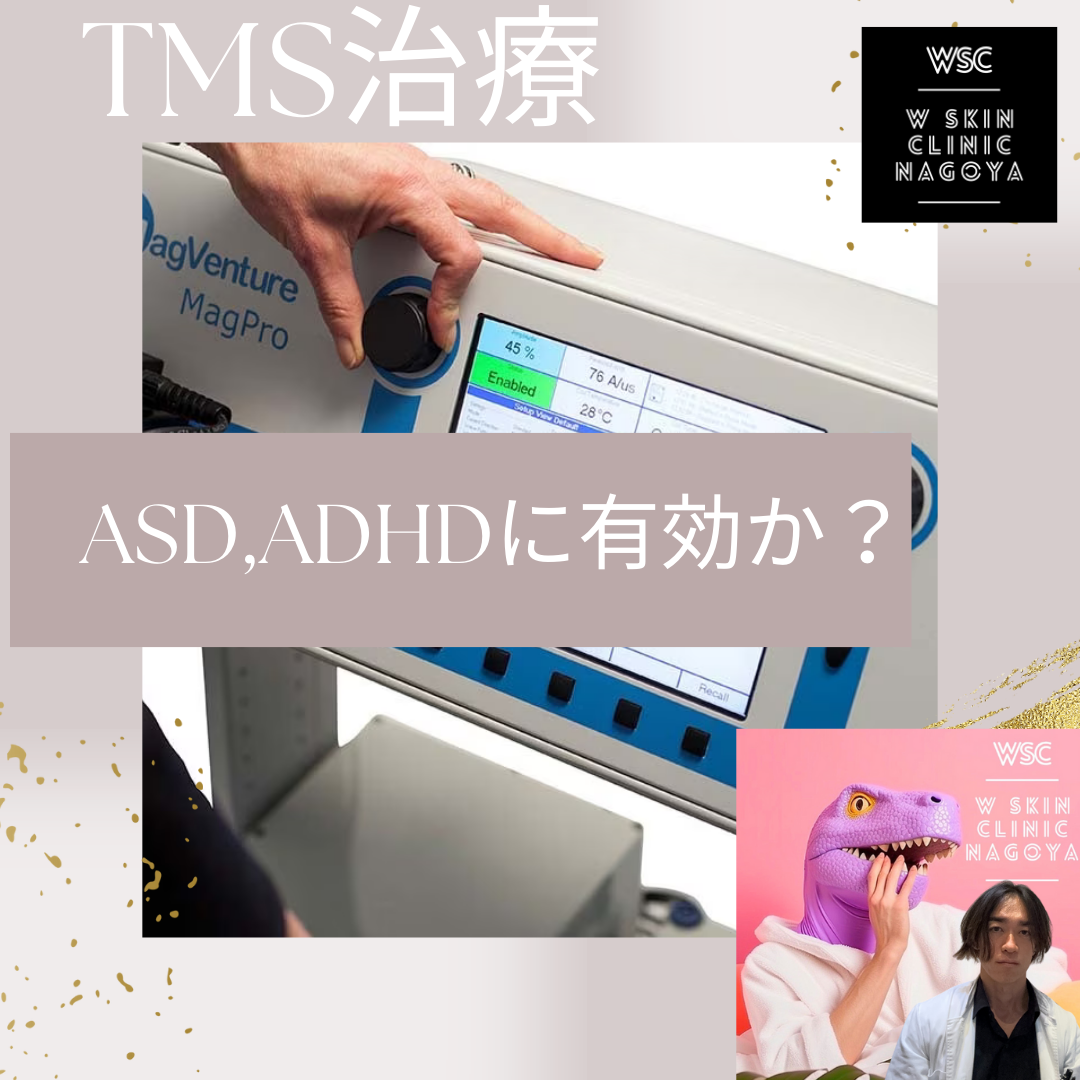NEWSお知らせ
2024.09.23|ブログ
ASDやADHDに合併するうつ病にも、TMS治療は有効か?名古屋の美容皮膚科医が解説

ASDやADHDに合併するうつ病にも、TMS治療は有効か?名古屋の美容皮膚科医が解説
こんにちは、Wスキンクリニック名古屋、院長の加藤晃司です。
今回は、ASDやADHDに合併するうつ病にも、TMS治療は有効か?について解説します。
TMS治療(経頭蓋磁気刺激療法、Transcranial Magnetic Stimulation)は、主に治療抵抗性のうつ病に対して有効な治療法として広く用いられていますが、ASD(自閉スペクトラム症)やADHD(注意欠陥・多動性障害)に合併するうつ病にも有効である可能性があります。以下に、その有効性について詳しく説明します。
- ASDやADHDに合併するうつ病とTMS治療の可能性
- ASDとADHDに合併するうつ病の特徴
ASD(自閉スペクトラム症)やADHD(注意欠陥・多動性障害)を持つ人々は、一般的にうつ病を発症するリスクが高いとされています。これらの発達障害に伴う日常のストレスや対人関係の困難さ、自己調整機能の低下などが、うつ症状を引き起こす要因となることがあります。
さらに、ASDやADHDの人々は、感情やストレスの処理が難しいため、うつ病の治療に対する反応が他の患者と異なる場合があります。特に、薬物療法に対する耐性や副作用が出やすい場合があるため、非薬物療法としてのTMS治療が注目されています。
- TMS治療の作用メカニズム
TMS治療は、脳の特定部位に磁気パルスを当てることで、神経回路の活動を調整します。特に、うつ病に対しては前頭前野に磁気刺激を与えることで、感情調整や認知機能を司る神経回路を活性化し、うつ症状を改善する効果があります。
- TMS治療がASD・ADHDに合併するうつ病に有効である理由
神経回路の調整: ASDやADHDの患者は、前頭前野や他の神経回路において機能の不均衡があるとされます。TMSは、これらの不均衡を調整し、感情の安定や注意力の向上、気分改善に寄与する可能性があります。
非侵襲的かつ副作用が少ない: ASDやADHDを持つ患者は、薬物に対して敏感で、副作用を強く感じることが多いです。TMSは非侵襲的であり、薬物に伴う全身的な副作用が少ないため、安全性が高い治療法です。
- ASDやADHDにおけるTMS治療の臨床的エビデンス
- TMS治療とうつ病
TMS治療は、うつ病に対する効果が確立されており、治療抵抗性のうつ病患者にも有効であることが示されています。多くの研究で、薬物療法や心理療法が効果を示さなかった患者に対してTMSが有効であることが確認されています。
- ASDやADHDに対するTMS治療の研究
ASDにおけるTMS治療: ASDの患者に対しては、TMSが社会的スキルの向上や感情調整の改善に効果があることがいくつかの研究で示されています。特に、前頭前野への刺激が、感情や行動の調整に役立つ可能性が示唆されています。
ADHDにおけるTMS治療: ADHD患者に対しても、TMSが注意力や衝動性の改善に効果があるとする研究があります。前頭前野への刺激が、注意力や実行機能を向上させ、ADHDの症状軽減に寄与する可能性があります。
- うつ病との併用効果
ASDやADHDの患者におけるTMS治療のうつ病治療効果については、限定的な研究が多いものの、うつ症状の軽減に対して一定の効果が期待されています。特に、ASDやADHD患者のうつ病は、薬物療法が難しいケースが多いため、TMS治療は有効な代替手段として位置づけられています。
- TMS治療のメリットとデメリット
①メリット
非侵襲的で安全: TMSは手術や侵襲的な治療法ではなく、副作用も比較的少ないため、薬物療法に抵抗のある患者や薬物療法で効果が出にくい患者にとって理想的な治療法です。
日常生活への影響が少ない: TMS治療は1回のセッションが短く、日常生活に支障をきたさないため、継続的な治療がしやすい点が魅力です。
②デメリット
効果に個人差がある: TMSの効果は患者によって異なるため、全ての患者に効果が見られるわけではありません。
複数回の治療が必要: TMS治療は通常、数週間から数ヶ月にわたって複数回行う必要があります。そのため、治療に時間と継続的な通院が必要です。
- まとめ
TMS治療は、ASDやADHDに合併するうつ病の治療にも効果的である可能性があります。うつ病に対するTMSの効果は広く認められており、ASDやADHD患者に対しても、非侵襲的で安全な治療法として期待されています。特に、薬物療法に対する耐性や副作用が問題となる場合、TMSは有力な治療オプションとなり得ます。
またTMS治療のみでは改善しない、倦怠感、身体症状などはエクソソームやNMNが有効なので、早く改善したい場合は併用をおすすめします。
Wスキンクリニック名古屋での、TMS治療はこちら
https://www.w-clinic-nagoya.com/tms
現在TMS治療のモニター募集しております。
ご興味のある方は、クリニックまでお問い合わせください。
Wスキンクリニック名古屋
理事長 加藤晃司
当院では無料でスタッフカウンセリングを行なっております。
お気軽にご予約くださいませ
Wスキンクリニック名古屋 (美容皮膚科)
https://www.w-clinic-nagoya.com/
〒461-0005 愛知県名古屋市東区東桜 2-4-1 第3コジマビル6F
TEL 052-7377-7117(10:00~19:00)
LINE ID @w.nagoya
高岳駅より徒歩4分 / 新栄町駅より徒歩5分
お車でお越しの方
名鉄協商パーキングチケットをお渡しいたしますので、クリニック近くのパーキングをご利用ください。
ご予約、お問合せ、Wスキンクリニック名古屋公式LINEからも可能です。
LINE ID : @w.nagoya
友達追加は↓から
Wスキンクリニック名古屋公式インスタ↓
https://www.instagram.com/w.skinclinic.nagoya?igsh=NHhoODFnaXB2b2ll&utm_source=qr
Wスキンクリニック院長 加藤晃司インスタ↓
https://www.instagram.com/w.skin.nagoya.kojikato?igsh=aW9nbWZwNjNjZ3pz&utm_source=qr
Is TMS Treatment Effective for Depression Associated with ASD or ADHD? A Nagoya Cosmetic Dermatologist Explains
Hello, I’m Dr. Koji Kato, the director of W Skin Clinic Nagoya.
In this article, I will explain whether TMS treatment (Transcranial Magnetic Stimulation) is effective for depression that occurs in conjunction with ASD (Autism Spectrum Disorder) or ADHD (Attention Deficit Hyperactivity Disorder).
- The Potential of TMS for Depression in ASD and ADHD
- Depression in ASD and ADHD
Individuals with ASD or ADHD are at a higher risk of developing depression due to various challenges such as social interaction difficulties, emotional regulation issues, and stress from daily life. These factors can significantly contribute to the onset of depressive symptoms.
Because individuals with ASD or ADHD often face difficulties in processing emotions and handling stress, their response to conventional depression treatments may differ. Medications, in particular, may be less effective or cause undesirable side effects, making non-drug therapies like TMS an attractive option.
- How TMS Works
TMS involves applying magnetic pulses to specific areas of the brain, typically targeting the prefrontal cortex, to regulate neural activity. This is especially effective in treating depression by stimulating the regions of the brain responsible for emotional regulation and cognitive functions, which can alleviate depressive symptoms.
- Why TMS Can Be Effective for ASD and ADHD-Related Depression
Neural Circuit Regulation: Individuals with ASD or ADHD often experience imbalances in brain activity, particularly in the prefrontal cortex. TMS helps rebalance these circuits, leading to improved mood regulation, focus, and emotional stability.
Non-Invasive with Few Side Effects: People with ASD or ADHD tend to be more sensitive to medication side effects. TMS offers a non-invasive alternative with fewer side effects, making it a safer treatment option for these patients.
- Clinical Evidence Supporting TMS for ASD and ADHD
- TMS for Depression
TMS is well-established as an effective treatment for depression, particularly for patients with treatment-resistant depression. Many studies have shown its efficacy in individuals who did not respond to medications or psychotherapy.
- TMS Research for ASD and ADHD
ASD: Some studies suggest that TMS can improve social skills and emotional regulation in individuals with ASD. Stimulation of the prefrontal cortex may help modulate behavior and emotional responses.
ADHD: Research has also shown that TMS can help improve attention and reduce impulsivity in ADHD patients. Stimulating the prefrontal cortex may enhance executive functioning, leading to improvements in ADHD symptoms.
- Combined Depression and ASD/ADHD
While research on TMS for depression in ASD or ADHD patients is still limited, early studies suggest that TMS may be beneficial for reducing depressive symptoms in these populations. Given the challenges associated with medication in these cases, TMS offers a promising alternative.
- Pros and Cons of TMS for Depression in ASD/ADHD
Pros:
Safe and Non-Invasive: TMS does not involve surgery or medication, making it a safer option with minimal side effects, particularly for patients sensitive to drugs.
Minimal Impact on Daily Life: TMS sessions are short, and patients can continue their regular activities immediately after each session, making it a convenient treatment option.
Cons:
Individual Variability: Not all patients respond to TMS, and its effectiveness can vary depending on the individual.
Multiple Sessions Required: TMS treatment typically requires several sessions over weeks or months, necessitating ongoing commitment to see results.
- Conclusion
TMS treatment holds promise for managing depression in individuals with ASD or ADHD. While more research is needed, current evidence supports the effectiveness of TMS in treating depression, and its non-invasive nature makes it a viable option for those who struggle with medication or face treatment resistance. Additionally, TMS can help improve emotional regulation and cognitive functions in ASD or ADHD, making it a valuable tool for these patients.
For more comprehensive treatment, patients may also benefit from combining TMS with other therapies like exosomes or NMN, which can help with fatigue and physical symptoms that may not improve solely with TMS.




